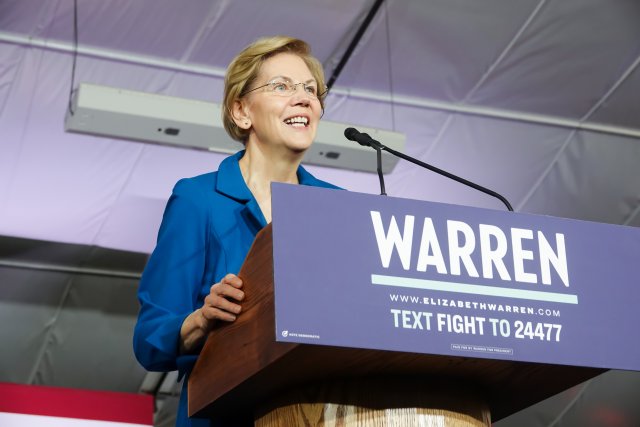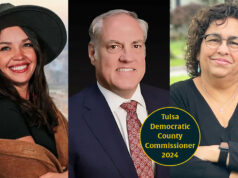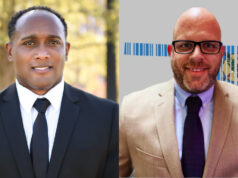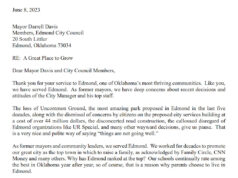
MANCHESTER, N.H. — Oklahoma native Sen. Elizabeth Warren (D-MA) sent staffers to South Carolina and Nevada this week, hoping to revive her campaign for the Democratic nomination as she reminded supporters she “could go the distance” and could unite Democrats.
Nevada voters will caucus on Feb. 22, and South Carolina’s primary is Feb. 29. Those are the next two battlegrounds before Oklahomans go to the polls on Super Tuesday, March 3, along with 13 other states. Raised in Oklahoma, Warren believes the Sooner State could be a victory for her campaign.
This story was reported by Gaylord News, a Washington reporting project of the Gaylord College of Journalism and Mass Communication at the University of Oklahoma.
But after a disappointing loss in Iowa, New Hampshire’s primary Tuesday was the first opportunity for the U.S. senator from Massachusetts to revive her campaign. However, New Hampshire did not prove to be her comeback state despite it being a neighbor to Massachusetts.
As results rolled in showing Warren in a solid fourth place, she stuck by the idea her campaign was “made to go the distance,” a statement that brought a roar of approval from supporters.
Warren also praised fellow Democratic candidates such as Sen. Bernie Sanders (D-VT), former South Bend, Indiana Mayor Pete Buttigieg and Sen. Amy Klobuchar (D-MN) in her speech Tuesday night.
“Senator Sanders and Mayor Buttigieg are both great people, and either one of them would be a far better president than Donald Trump,” Warren said. “I respect them both.”
But Warren said she is best-suited to unite the party.
“Our campaign is best positioned to beat Donald Trump in November because we can unite our party,” Warren said. “We can unite this party and this country by mobilizing people behind ideas that are not only popular with huge majorities of the American people, but that also accomplish structural change for our broken government and our rigged economy.”
‘She wants to create opportunities’
One Florida man, Noah Miller, who traveled to New Hampshire to see Warren and canvass for her campaign, said he believes in that message.
“I think she is the one [candidate] who can unite the Democratic party,” Miller said. “Her message to me means uniting the Democratic Party and not repeating the mistakes of 2016.”
In New Hampshire, Sanders came out on top with 25.7 percent followed closely by Buttigieg at 24.4 percent. Klobuchar trailed at 19.8 percent and Warren ended the night with 9.2 percent of the vote.
Warren supporters seemed confident her campaign was, in fact, built to last.
Chris Stewart, 26, is one of those hopeful supporters.
“I have no doubt in my mind that Elizabeth Warren would be the best president we could possibly elect,” Stewart said.
As a young voter, Stewart said he has a different reality than other generations of voters.
“I feel like a lot of my friends really understand that our generation has not been getting or reaping the economic rewards and we don’t have the same opportunities as our parents’ generation,” Stewart said. “I think Senator Warren’s message really hits that point home. She wants to create opportunities for people like me.”
The age category of 18 to 29-year-olds make up 14 percent of American voters. Overall, they have not echoed that support for Warren’s campaign.
According to an exit poll done in New Hampshire, only 6 percent of 18 to 29-year-olds were in support of Warren. Buttigieg polled at 20 percent, and Sanders led that category at 51 percent.
Buttigieg has previously struggled with the young vote but appears to be winning over that constituency.
Klobuchar also is struggling to rally the young vote. Her most popular age category of voters is the 45-64 range and the 65 and older age group, which make up a combined 63 percent of voters.
Sanders and Warren continue to dominate the self-identified liberal vote while Buttigieg and Klobuchar are neck-and-neck when it comes to more moderate or conservative Democratic primary voters.
Warren said there is still a long race ahead when it comes to the 55 other states and territories that have yet to vote.
Supporter Ani Suvarana also believed it was a little early for Warren wave the white flag.
“I am still hopeful,” Suvarana said. “It is still very early. It kind of irks me that people are already rushing to set the narrative after just two very small states have voted.”























